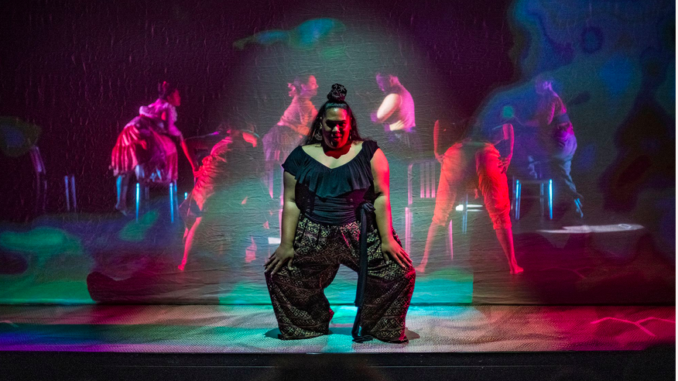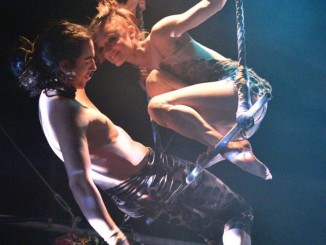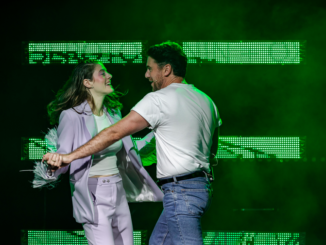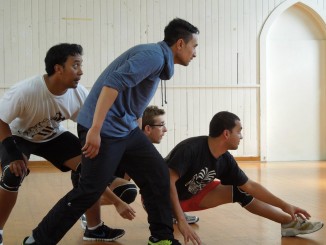
Poetry and theatre lovers alike have been eagerly awaiting Tusiata Avia’s The Savage Coloniser Show to grace the stage. The Savage Coloniser Book is the second book of poetry by Avia to be transformed into an ensemble stage play since the award winning Wild Dogs Under My Skirt. Both shows have been produced by Victor Rodger (F.C.C) and directed by Anapela Polata’ivao. Many of the cast remain from Wild Dogs, and are joined by Mario Faumui and the young Iuni-Katalaina Polata’ivao-Saute in her acting debut.
I was lucky to catch the show on closing night. I milled into the Rangatira performance space at Q theatre with a varied audience spanning the cultural communities of Auckland – a welcoming sight. As the last two empty seats in the house disappear, the lights go down and a stage enveloped in atmospheric haze takes focus. A transparent net is stretched across the scene, which becomes a screen for projected images. Chairs with sheaths strapped to them await the ensemble, and are lit an earthy red – evoking representations of blood, earth, and courage. A projected white frame demarcates the scene, honing the audience’s awareness to consider carefully what they see.
The show begins in pre-colonial times in a spiritual realm. From there emerge the voices of Samoan women, with words of resistance, and reclamation. Anapela Polata’ivao’s direction and artistry brings another dimension to Avia’s poetry as the words come off the page. Every member of the ensemble gives a flawless performance. Joanna Mika-Toloa foreshadows how I, as a brown woman, felt by the end of the show, with a stunning performance of Nina Simone’s ‘Feeling Good’. As you might expect, judging from the title, the show is confrontational and unapologetic in its approach to the effects of colonisation.
‘The City Fathers’, is a newer poem which doesn’t appear in the book, but is a pertinent addition to the show. The poem is a focal point in the history of racism in New Zealand and how that racism is still upheld today – in this case in the form of statues in the colonial city of Christchurch in which Avia was born and raised. The figures represented by these prominent statues are also leaders of land grabs and a Minister of Native Affairs who ordered the invasion of Parihaka. This was also a time when Māori were assimilated into, but also segregated from Pākehā society. The Christchurch massacre is then placed in the timeline, bringing the past and present together in the bleakest of ways. History underpins the journey of the show and examples of white supremacist thinking, today and in the past, are weaved throughout, subverted, and spat back out at the racists.
The poetry is generous and offers insights, often opening a door into the writer’s personal realm, though it is still a place that reflects ourselves back to us. The transitions and choreography by Tupua Tifagua dips into these realms and are a visual treat; blue oceanic coloured material tugs a performer back and forth, dusky maidens are placed on stage like figurines and then fawn over shiny sequined fabric in a spotlight. The sheaths strapped to the chairs reveal glinting machetes early on in the play, and bolsters this feeling that wounds will be opened and truths will spill like blood.
It came to my attention before the show that the contents of the poem ‘250th anniversary of James Cook’s arrival in New Zealand’ caused a stir amongst some politicians like ACT party leader David Seymour who took a literal reading of the poem and claimed it might incite violence. If you so choose, you can look into the details of the incident. And even though I don’t think much time or attention should be spent on this issue, I still feel that some discussion should take place because it’s a reflection of the problems we still face in our day to day lives. No, brown women driving around in SUVs and beating up people is not a thing. It will never be a thing. And maybe if examined more closely, one could see what actually fuels hate crimes, and why it’s not a poem, or a play, and won’t ever be racially disgruntled brown women cruising around in a big car. At least the humour in the poem was obvious in performance as it got laughs from the audience at the punchlines.
The Savage Coloniser Show is honest, disruptive, and empowering as we are taken on a journey, through a landscape, and several perspectives. Painful and buried racism in our history is dug up, displayed, and pulled apart. The effects of colonisation are brought to the fore and set alongside our dysfunctional present so that we may draw lines between them. The reward for an unapologetic approach to the subject is catharsis for the audience, or unprecedented insight. Anyone who resides in this country is sure to see a part of themselves in the show.
The Savage Coloniser Show plays Rangatira, Q Theatre 9–12 March, 2023 as part of Auckland Arts Festival




Leave a Reply